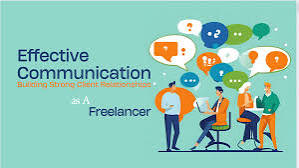Effective Communication: The Secret to Building Lasting Relationships

Effective communication is the cornerstone of any successful relationship, whether it’s with a partner, family member, friend, or colleague. It goes beyond merely exchanging words—it’s about understanding, connection, and empathy. Strong communication builds trust, resolves conflicts, and fosters deeper emotional bonds, creating relationships that can withstand the test of time.
This article delves into the importance of effective communication, the barriers that hinder it, and strategies to enhance communication skills to build lasting relationships.
Why Communication Matters in Relationships
At its core, communication is how people share thoughts, emotions, and intentions. In relationships, it serves several vital purposes:
- Building Trust: Open and honest communication creates a safe environment where both parties feel heard and valued.
- Fostering Emotional Intimacy: Sharing feelings and experiences helps deepen emotional connections.
- Resolving Conflicts: Constructive communication allows disagreements to be addressed calmly and effectively.
- Clarifying Expectations: Clear communication prevents misunderstandings and aligns goals and expectations.
- Strengthening Connection: Regular and meaningful conversations reinforce bonds, keeping relationships vibrant and fulfilling.
Common Barriers to Effective Communication
Despite its importance, many people struggle with communication. Understanding the barriers can help you address and overcome them:
- Assumptions and Misinterpretations: Assuming you know what the other person is thinking can lead to misunderstandings.
- Lack of Active Listening: Focusing more on responding rather than understanding what’s being said disrupts communication.
- Emotional Reactivity: Anger, frustration, or defensiveness can escalate conflicts instead of resolving them.
- Fear of Vulnerability: Holding back thoughts or feelings out of fear of rejection or judgment limits honest conversations.
- Cultural or Generational Differences: Differences in communication styles can create unintentional barriers.
Strategies for Effective Communication
1. Practice Active Listening
Active listening involves fully focusing on the speaker, understanding their message, and responding thoughtfully.
- How to Improve:
- Maintain eye contact and use nonverbal cues like nodding.
- Avoid interrupting or planning your response while they’re speaking.
- Summarize or paraphrase their points to confirm understanding.
2. Be Clear and Concise
Ambiguity can lead to confusion and misunderstandings.
- How to Improve:
- State your thoughts clearly and avoid unnecessary details.
- Use “I” statements to express your feelings without blaming. For example, say, “I feel hurt when…” instead of “You always make me feel…”
3. Cultivate Empathy
Empathy helps you understand the other person’s perspective, fostering mutual respect.
- How to Improve:
- Put yourself in the other person’s shoes before reacting.
- Validate their feelings by acknowledging their emotions, even if you don’t agree with their viewpoint.
4. Control Emotional Responses
Reacting impulsively can escalate conflicts.
- How to Improve:
- Take a deep breath before responding during heated moments.
- Practice mindfulness to manage stress and maintain composure.
- If emotions run high, suggest taking a break and revisiting the conversation later.
5. Pay Attention to Nonverbal Communication
Body language, tone of voice, and facial expressions often convey more than words.
- How to Improve:
- Ensure your nonverbal cues match your message. For example, smiling while expressing concern can send mixed signals.
- Be aware of the other person’s body language to gauge their feelings.
6. Ask Open-Ended Questions
Encourage meaningful dialogue by asking questions that require more than a “yes” or “no” answer.
- Examples:
- “How do you feel about this situation?”
- “What can we do together to resolve this issue?”
7. Learn to Apologize and Forgive
Mistakes are inevitable in relationships, but owning up to them and offering sincere apologies can mend trust.
- How to Improve:
- Acknowledge your part in the misunderstanding.
- Avoid making excuses or justifying your actions.
- Forgive others when they apologize to foster healing and growth.
8. Set Aside Time for Meaningful Conversations
In today’s fast-paced world, it’s easy to overlook the importance of dedicated time for communication.
- How to Improve:
- Schedule regular check-ins with loved ones.
- Create a distraction-free environment by turning off devices and focusing entirely on the conversation.
The Role of Technology in Communication
Technology has transformed how we communicate, offering both opportunities and challenges.
Opportunities:
- Instant Connectivity: Tools like video calls, messaging apps, and social media make it easier to stay connected across distances.
- Facilitating Difficult Conversations: Written communication can provide a buffer for sensitive topics.
Challenges:
- Overreliance on Texting: Text-based communication can lead to misinterpretations due to the lack of tone and nonverbal cues.
- Distractions: Excessive use of devices can interfere with meaningful in-person interactions.
Tips for Balancing Technology:
- Use technology as a supplement, not a replacement, for face-to-face communication.
- Be mindful of screen time during conversations to ensure full attention.
How Effective Communication Strengthens Relationships
- Enhances Trust: Open dialogue builds a foundation of trust, ensuring both parties feel secure and valued.
- Deepens Emotional Bonds: Sharing thoughts, dreams, and fears fosters a deeper connection.
- Encourages Mutual Growth: Constructive conversations inspire personal and relational growth.
- Prevents Resentment: Addressing issues early prevents misunderstandings from festering.
Real-Life Examples of Effective Communication
- Couples: Regularly expressing appreciation and discussing concerns strengthens marital bonds.
- Friends: Active listening and empathy keep friendships strong, even during disagreements.
- Workplace Relationships: Clear and concise communication enhances collaboration and reduces conflicts.
Final Thoughts
Effective communication is not just about exchanging words—it’s about understanding, connecting, and building a foundation of trust and respect. By practicing active listening, expressing yourself clearly, and cultivating empathy, you can foster lasting relationships in all areas of life.
While it takes effort and practice, the rewards are well worth it. Strong communication paves the way for deeper connections, stronger bonds, and a more fulfilling life. Start applying these strategies today, and watch your relationships flourish like never before.



